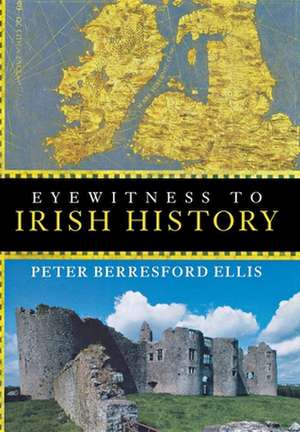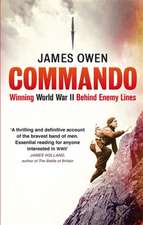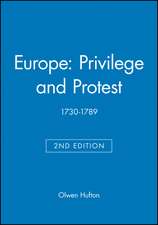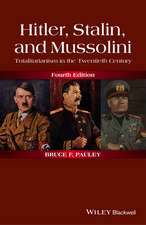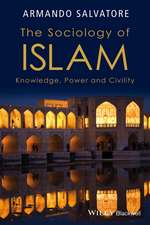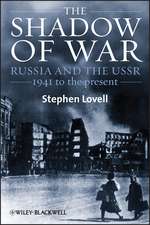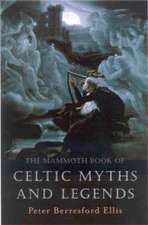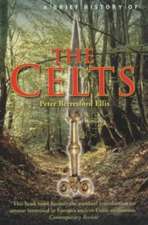Eyewitness to Irish History
Autor Peter Berresford Ellisen Limba Engleză Hardback – 11 mar 2004
| Toate formatele și edițiile | Preț | Express |
|---|---|---|
| Paperback (1) | 106.79 lei 3-5 săpt. | |
| Wiley – mar 2007 | 106.79 lei 3-5 săpt. | |
| Hardback (1) | 213.15 lei 3-5 săpt. | |
| Wiley – 11 mar 2004 | 213.15 lei 3-5 săpt. |
Preț: 213.15 lei
Nou
Puncte Express: 320
Preț estimativ în valută:
40.79€ • 42.14$ • 33.93£
40.79€ • 42.14$ • 33.93£
Carte disponibilă
Livrare economică 26 februarie-12 martie
Preluare comenzi: 021 569.72.76
Specificații
ISBN-13: 9780471266334
ISBN-10: 0471266337
Pagini: 312
Dimensiuni: 155 x 244 x 29 mm
Greutate: 0.54 kg
Editura: Wiley
Locul publicării:Hoboken, United States
ISBN-10: 0471266337
Pagini: 312
Dimensiuni: 155 x 244 x 29 mm
Greutate: 0.54 kg
Editura: Wiley
Locul publicării:Hoboken, United States
Public țintă
1. The countless Irish Americans curious about their rootsDescriere
Ollamh Fodhla, fierce in valour,
Marked out the Scholar’s Rampart,
The first mighty king with grace
Who convened the Festival of Tara. Fifty years, it was tuneful fame,
Was he in the High Kingship over Ireland
So that from him, with fortunate freedom,
Ulaidh [Ulster] received its name.
He died a natural death within his capital.
Lebor Gabála Erenn (Book of Invasions)
"I have often said, and written, it is Famine which must consume them (the Irish); our swords and other endeavours work not that speedy effect which is expected, for their overthrow."
Lord Arthur Chichester, Lord Deputy, November 22, 1601
Written to Lord Burghley, chief adviser to Queen Elizabeth I
"In O’Connell Street large groups of people were gathered together. From the flagstaff pole on top of the General Post Office, the GPO, floated a new flag, a tricolour one of green, white and orange, the colours running out from the mast. ‘What’s it all about?’ I asked a man who stood near me, a scowl on his face. ‘Those boyhoes, [sic] the Volunteers, have seized the Post Office. They want nothing less than a Republic,’ he laughed scornfully. ‘They’ve killed some Lancers; but they’ll soon run away when the soldiers come.’ "
Ernie O’Malley
On Another Man’s Wound, London, 1936
Marked out the Scholar’s Rampart,
The first mighty king with grace
Who convened the Festival of Tara. Fifty years, it was tuneful fame,
Was he in the High Kingship over Ireland
So that from him, with fortunate freedom,
Ulaidh [Ulster] received its name.
He died a natural death within his capital.
Lebor Gabála Erenn (Book of Invasions)
"I have often said, and written, it is Famine which must consume them (the Irish); our swords and other endeavours work not that speedy effect which is expected, for their overthrow."
Lord Arthur Chichester, Lord Deputy, November 22, 1601
Written to Lord Burghley, chief adviser to Queen Elizabeth I
"In O’Connell Street large groups of people were gathered together. From the flagstaff pole on top of the General Post Office, the GPO, floated a new flag, a tricolour one of green, white and orange, the colours running out from the mast. ‘What’s it all about?’ I asked a man who stood near me, a scowl on his face. ‘Those boyhoes, [sic] the Volunteers, have seized the Post Office. They want nothing less than a Republic,’ he laughed scornfully. ‘They’ve killed some Lancers; but they’ll soon run away when the soldiers come.’ "
Ernie O’Malley
On Another Man’s Wound, London, 1936
Textul de pe ultima copertă
Ollamh Fodhla, fierce in valour,
Marked out the Scholar’s Rampart,
The first mighty king with grace
Who convened the Festival of Tara. Fifty years, it was tuneful fame,
Was he in the High Kingship over Ireland
So that from him, with fortunate freedom,
Ulaidh [Ulster] received its name.
He died a natural death within his capital.
Lebor Gabála Erenn (Book of Invasions)
"I have often said, and written, it is Famine which must consume them (the Irish); our swords and other endeavours work not that speedy effect which is expected, for their overthrow."
Lord Arthur Chichester, Lord Deputy, November 22, 1601
Written to Lord Burghley, chief adviser to Queen Elizabeth I
"In O’Connell Street large groups of people were gathered together. From the flagstaff pole on top of the General Post Office, the GPO, floated a new flag, a tricolour one of green, white and orange, the colours running out from the mast. ‘What’s it all about?’ I asked a man who stood near me, a scowl on his face. ‘Those boyhoes, [sic] the Volunteers, have seized the Post Office. They want nothing less than a Republic,’ he laughed scornfully. ‘They’ve killed some Lancers; but they’ll soon run away when the soldiers come.’ "
Ernie O’Malley
On Another Man’s Wound, London, 1936
Marked out the Scholar’s Rampart,
The first mighty king with grace
Who convened the Festival of Tara. Fifty years, it was tuneful fame,
Was he in the High Kingship over Ireland
So that from him, with fortunate freedom,
Ulaidh [Ulster] received its name.
He died a natural death within his capital.
Lebor Gabála Erenn (Book of Invasions)
"I have often said, and written, it is Famine which must consume them (the Irish); our swords and other endeavours work not that speedy effect which is expected, for their overthrow."
Lord Arthur Chichester, Lord Deputy, November 22, 1601
Written to Lord Burghley, chief adviser to Queen Elizabeth I
"In O’Connell Street large groups of people were gathered together. From the flagstaff pole on top of the General Post Office, the GPO, floated a new flag, a tricolour one of green, white and orange, the colours running out from the mast. ‘What’s it all about?’ I asked a man who stood near me, a scowl on his face. ‘Those boyhoes, [sic] the Volunteers, have seized the Post Office. They want nothing less than a Republic,’ he laughed scornfully. ‘They’ve killed some Lancers; but they’ll soon run away when the soldiers come.’ "
Ernie O’Malley
On Another Man’s Wound, London, 1936
Cuprins
Acknowledgments. Introduction.
1. Ancient Ireland.
2. Early Christian Ireland.
3. The Viking Terror.
4. Ireland and the Angevin Empire.
5. Irish Princes and Norman Lords.
6. The Tudor Conquests.
7. The Flight of the Princes.
8. Obedience to the English Empire.
9. The Insurrection of 1641.
10. The Cromwellian Conquest.
11. The Williamite Conquest.
12. The Penal Laws.
13. The Insurrection of 1798.
14. Union, 1801; Insurrection, 1803; Catholic Emancipation, 1829.
15. Repeal, Starvation, and the Insurrection of 1848.
16. The Insurrection of 1867 and the Land League.
17. The Insurrection of 1916.
18. The War of Independence, 1919 1921.
19. The Civil War, 1922 1923, and the Aftermath.
20. Irish Neutrality and the Irish Republic of 1949.
21. A Protestant State and Civil Rights.
22. The Long War.
L Envoi.
Further Reading.
Index.
1. Ancient Ireland.
2. Early Christian Ireland.
3. The Viking Terror.
4. Ireland and the Angevin Empire.
5. Irish Princes and Norman Lords.
6. The Tudor Conquests.
7. The Flight of the Princes.
8. Obedience to the English Empire.
9. The Insurrection of 1641.
10. The Cromwellian Conquest.
11. The Williamite Conquest.
12. The Penal Laws.
13. The Insurrection of 1798.
14. Union, 1801; Insurrection, 1803; Catholic Emancipation, 1829.
15. Repeal, Starvation, and the Insurrection of 1848.
16. The Insurrection of 1867 and the Land League.
17. The Insurrection of 1916.
18. The War of Independence, 1919 1921.
19. The Civil War, 1922 1923, and the Aftermath.
20. Irish Neutrality and the Irish Republic of 1949.
21. A Protestant State and Civil Rights.
22. The Long War.
L Envoi.
Further Reading.
Index.
Recenzii
This splendid book is an antidote to the antinationalist revisionism (Irish Democrat, Oct/Nov 2004) Unsurprisingly there is an awful lot of gunpowder, rapiers, pikes, musket balls and more recent technologies of killing (Belfast Telegraph, 8 May 2004)
a goldmine of information As a starting point for students and the general reader, this book can t be criticised. (The Herald (Glasgow), 1 May 2004)
This splendid book is an antidote to the antinationalist revisionism (Irish Democrat, Oct/Nov 2004) "Unsurprisingly there is an awful lot of gunpowder, rapiers, pikes, musket balls and more recent technologies of killing..." (Belfast Telegraph, 8 May 2004)
a goldmine of information As a starting point for students and the general reader, this book can t be criticised. (The Herald (Glasgow), 1 May 2004)
a goldmine of information As a starting point for students and the general reader, this book can t be criticised. (The Herald (Glasgow), 1 May 2004)
This splendid book is an antidote to the antinationalist revisionism (Irish Democrat, Oct/Nov 2004) "Unsurprisingly there is an awful lot of gunpowder, rapiers, pikes, musket balls and more recent technologies of killing..." (Belfast Telegraph, 8 May 2004)
a goldmine of information As a starting point for students and the general reader, this book can t be criticised. (The Herald (Glasgow), 1 May 2004)
Notă biografică
PETER BERRESFORD ELLIS, from an old Cork family, took his degrees in Celtic Studies and was recently acclaimed as "the pre–eminent Celtic Scholar now writing" (Times Educational Supplement). As well as his popular books on the ancient Celts, he is the author of many notable Irish histories, including History of the Irish Working Class; Hell or Connaught!: The Cromwellian Colonization of Ireland 1652 1660; The Boyne Water: The Battle of the Boyne, 1690; A Dictionary of Irish Mythology; and Erin s Blood Royal. Under his own name he was the author of a bestselling novel The Rising of the Moon, about the Irish Republican Brotherhood s 1866 attempt to invade Canada. Under the pseudonym of Peter Tremayne, he is best known for his internationally bestselling Sister Fidelma mystery series set in seventh– century Ireland. He lives in London.
